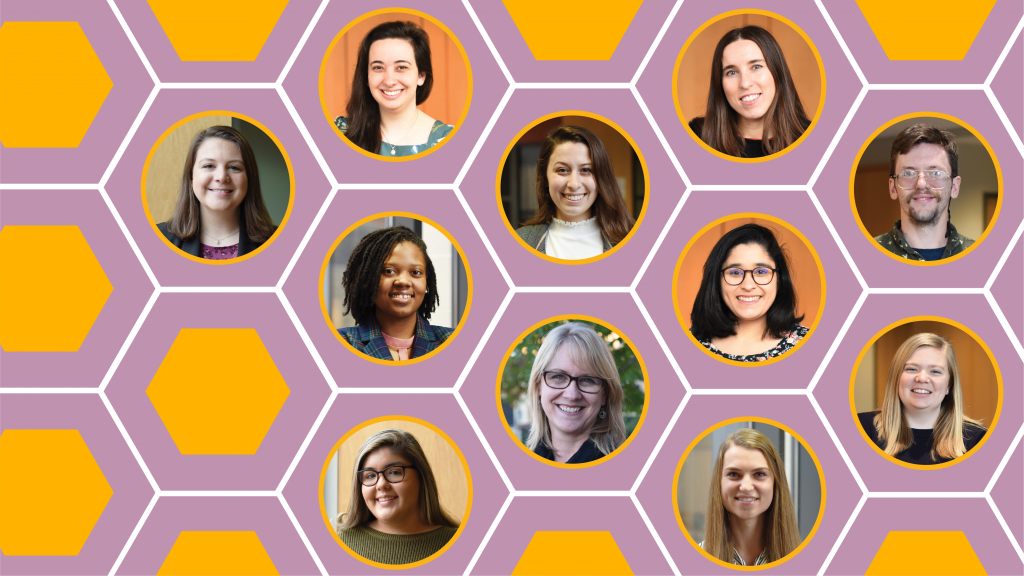Child Welfare Stipend Program: Congrats to 11 new graduates!

The Child Welfare Stipend Program (CWSP) at the VCU School of Social Work is, quite literally, a force for good. More specifically, it’s a pipeline to a statewide workforce that is doing good.
With 11 master’s students in the program graduating May 8, VCU has produced 25 graduates over three years in its partnership with the Virginia Department of Social Services.
“The CWSP at VCU gives students the opportunity to focus their social work education on engaging families, supporting children and fostering connections for families within the child welfare system,” says Naomi Sutton Reddish, the program coordinator at the School of Social Work. “I am so incredibly proud of our 2020 graduates as they have continued to live into our social work values and ethics while finding creative ways to serve families and their field agencies in the middle of a pandemic. Their lives and schedules were disrupted and yet they continued to serve and learn in incredibly meaningful and tangible ways.
“These graduates partnered with their field instructors to continue the learning process while tirelessly finding new ways to ensure safety, enhance wellbeing, and continue to build permanent connections for youth and families who are child welfare-involved. I have heard from so many of our partner agencies about the impact of these graduates and their gratitude for our graduates’ selfless service to the community this year. They have done hard things with compassion and competence. Our hats are off to you, graduates!”
The federally funded program involves specialized training for students, who receive a $10,000 stipend and commit to working one calendar year at a local department of social services in Virginia for each year they receive a stipend.
The 2020 CWSP cohort offered their perspectives on a variety of topics.
Why did you choose or were you drawn to a focus on child welfare?
- Carson Hanna: “To be a champion for children and families who may not have had a champion before.”
- Briana Harris: “I know that the child welfare experience will assist me in being a change agent in the present, in the future and eventually on a macro level.”
- Andrea Perez: “I chose to focus on child welfare in order to take on the responsibility I have to my community by ensuring that children and families receive the services and supports they need.”
What impact has family engagement in child welfare made on your development as a social work practitioner?
- Caitlyn de Haas: “Continually working to involve the family in the process is imperative in effecting change on an individual and systemic level in order to promote positive outcomes.”
- Claire Friedmann: “This practice has solidified my understanding that I must create an environment in which clients know that their voices are respected, valued and heard in order to best serve youth and families.”
- Alison Pulliam: “Above all, family engagement has developed my compassion and given me a greater appreciation for diversity and the lived experiences of others.”
What skills have you built this year that have allowed you to be able to foster connections in your field placement?
- Paola Martinez: “I have learned to incorporate trauma-informed and therapeutic skills when engaging children and adolescents.”
- Cate Clifton: “I have built new skills around professionalism, engagement, assessment, intervention, empathy, ethics and cultural humility. These allow me to effectively connect with families, children, colleagues, community partners and others to benefit my field experience and future professional career.”
How has your field work in child welfare during this program assisted your agencies/teams in advocating for and supporting children?
- Andrea Aron-Schiavone: “My field practicum has strengthened my passion for advocating for youth and families that are often overlooked or treated unfairly. I am dedicated to collaborating with professionals, families and youth to provide the meaningful, individualized support and resources that families deserve.”
- Cynthia Joyner: “Because of the quality and intensity of training received through VCU, I have been able to bring fresh ideas and perspectives to public foster care work, in a way that strengthens the professional qualities we already exhibit, while also supporting leadership goals of improving trauma-informed child welfare services.”
- Thomas Pollard: “We know that children do best when they are with their families whenever possible, and in safe and permanent placements. This can be achieved by identifying and building on family strengths and providing services that directly address barriers to family stability and reunification.”